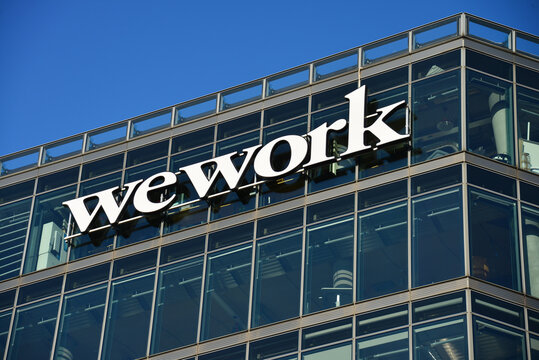Some links in this article may be affiliate links, meaning we may earn a small commission if you make a purchase through them.
Introduction:
The saga of WeWork stands as a modern parable of unchecked ambition, inflated valuations, and the perils of prioritizing growth at any cost in the world of startups. Founded in 2010 by Adam Neumann and Miguel McKelvey, WeWork swiftly emerged as a darling of the coworking industry, captivating investors with its vision of revolutionizing office space and community-driven work environments. However, beneath the veneer of innovation lay fundamental flaws in WeWork’s business model and corporate governance practices, which ultimately led to its spectacular downfall.
The Appeal of WeWork:
The Rise of the Sharing Economy: WeWork emerged during a time when the sharing economy was gaining momentum, driven by technology-enabled platforms that facilitated the efficient use of resources. Companies like Airbnb and Uber had already disrupted traditional industries by offering shared accommodation and transportation services. WeWork capitalized on this trend by applying the principles of sharing to the realm of office space, tapping into the growing demand for flexible work environments.
Flexible Office Space: One of WeWork’s key value propositions was its provision of flexible office space tailored to the needs of modern workers and businesses. Instead of locking tenants into long-term leases, WeWork offered short-term memberships that allowed companies to scale up or down as needed. This flexibility appealed to startups and freelancers who valued agility and cost-effectiveness in their workspace arrangements.
Amenities and Networking Opportunities: WeWork differentiated itself from traditional office landlords by offering a host of amenities and services designed to enhance the work experience. From high-speed internet and state-of-the-art conference rooms to complimentary refreshments and wellness programs, WeWork sought to create an environment conducive to productivity and collaboration. Additionally, WeWork’s emphasis on community-building fostered networking opportunities, enabling members to connect with like-minded individuals and potential collaborators.
Sleek, Modern Spaces: WeWork’s aesthetic design and attention to detail set it apart from traditional office environments. Its vibrant, contemporary spaces featured stylish furnishings, curated artwork, and ergonomic workstations, creating an atmosphere that was both functional and aesthetically pleasing. This focus on design appealed to startups and creative professionals who valued a modern, inspiring work environment.
Community-Centric Ethos: At the heart of WeWork’s appeal was its commitment to fostering a sense of community among its members. Through networking events, workshops, and social gatherings, WeWork sought to facilitate meaningful connections and collaborations among its diverse community of tenants. This community-centric ethos resonated with individuals and companies seeking more than just a place to work but a supportive ecosystem where they could thrive professionally and personally.
Research and Data: According to a study by CBRE Group, a leading commercial real estate services and investment firm, the demand for flexible office space has been steadily increasing in recent years, driven by factors such as the rise of remote work, the gig economy, and the need for cost-effective solutions. WeWork and other coworking operators have been at the forefront of this trend, capturing a growing share of the market and reshaping the dynamics of the commercial real estate industry.
By offering flexible terms, amenities, and a sense of community, WeWork tapped into the evolving needs and preferences of modern workers and businesses, positioning itself as a disruptive force in the world of office space. Despite its subsequent challenges and controversies, WeWork’s initial appeal remains a testament to the power of innovation, adaptability, and customer-centricity in shaping the future of work.
The Herd Mentality in Venture Capital:
Herd Mentality in Venture Capital: Herd mentality, also known as herd behavior or crowd psychology, refers to the tendency of individuals to follow the actions of the majority, particularly in situations of uncertainty or ambiguity. In the context of venture capital, herd mentality often manifests as a rush of investors seeking to capitalize on perceived opportunities in hot sectors or with high-profile startups. This behavior can lead to inflated valuations, overfunding, and a lack of critical scrutiny.
Frenzy of Hype and Speculation: WeWork’s meteoric rise to unicorn status was fueled by a frenzy of hype and speculation within venture capital circles. As the company garnered media attention and celebrity endorsements, investors clamored to get in on the action, fearing they would miss out on the next big thing. This irrational exuberance drove up WeWork’s valuation to astronomical levels, despite lingering doubts about its business model and sustainability.
Unprecedented Valuation: At its peak, WeWork was valued at over $47 billion, making it one of the most valuable startups in the world. This valuation was based on ambitious growth projections and lofty aspirations of disrupting the commercial real estate industry. However, many industry observers questioned the validity of WeWork’s valuation, citing concerns about its profitability, operational efficiency, and corporate governance practices.
Mounting Concerns: Despite its soaring valuation, WeWork faced mounting concerns from investors, analysts, and industry insiders. Questions were raised about the company’s corporate governance structure, particularly its founder and CEO Adam Neumann’s outsized influence and controversial leadership style. Additionally, doubts surfaced about WeWork’s ability to achieve profitability given its aggressive expansion strategy and escalating losses.
Financial Viability: As WeWork prepared for its highly anticipated initial public offering (IPO) in 2019, scrutiny of its financials intensified. The company’s S-1 filing revealed staggering losses, opaque accounting practices, and unconventional metrics used to gauge its performance. Investors grew increasingly skeptical about WeWork’s long-term viability and its ability to justify its sky-high valuation.
WeWork’s Valuation Soars:
Aggressive Expansion Strategy: WeWork’s valuation soared on the back of its ambitious expansion strategy, which saw the company rapidly acquiring and leasing office spaces in major cities around the world. By aggressively scaling its footprint, WeWork projected an image of unstoppable growth and dominance in the coworking space market. This strategy appealed to investors seeking high-growth opportunities and fueled optimism about WeWork’s long-term potential.
Charismatic Leadership: WeWork’s charismatic co-founder and CEO, Adam Neumann, played a pivotal role in shaping the company’s narrative and attracting investment. With his larger-than-life personality and grand vision for WeWork’s future, Neumann captivated investors and instilled confidence in the company’s ability to disrupt the commercial real estate industry. His ability to sell a compelling vision of community, collaboration, and innovation helped fuel WeWork’s valuation ascent.
Narrative of Disruption: WeWork positioned itself as a disruptor in the traditional office leasing market, offering a more flexible and community-oriented alternative to traditional office spaces. The company’s narrative of revolutionizing the way people work and interact resonated with investors who were eager to back innovative startups with the potential to reshape industries. This narrative, coupled with WeWork’s sleek branding and modern amenities, contributed to its allure and valuation growth.
Intensified Scrutiny and Doubts: As WeWork prepared for its highly anticipated initial public offering (IPO), scrutiny of its business model, financials, and leadership intensified. Skepticism grew about the company’s ability to achieve profitability and justify its lofty valuation, particularly in light of its mounting losses and unconventional corporate governance practices. Investors and analysts raised concerns about WeWork’s high cash burn rate, unsustainable growth trajectory, and lack of a clear path to profitability.
Signs of Trouble:
Lavish Spending and Corporate Governance Lapses: Reports surfaced about WeWork’s extravagant spending habits under the leadership of co-founder Adam Neumann. The company’s lavish expenditures on perks like private jets, luxury office spaces, and extravagant parties raised eyebrows among investors and stakeholders. Additionally, concerns were raised about potential conflicts of interest stemming from Neumann’s personal investments in properties leased by WeWork and his control over the company’s voting shares, which raised questions about corporate governance practices.
Erratic Behavior and Leadership Challenges: Adam Neumann’s unconventional leadership style and erratic behavior further fueled concerns about WeWork’s management. Reports of Neumann’s eccentric antics, including instances of self-aggrandizement and impulsive decision-making, contributed to a perception of instability within the company. Investors grew increasingly wary of Neumann’s ability to steer WeWork through turbulent waters and maintain a clear strategic direction amid mounting challenges.
Mounting Financial Losses and Lack of Profitability: Despite its rapid growth and expansive footprint, WeWork struggled to translate its top-line revenue into sustainable profitability. The company reported substantial losses year after year, driven by high operating expenses, expensive lease commitments, and aggressive expansion efforts. As investors scrutinized WeWork’s financials more closely, concerns grew about its ability to achieve profitability and justify its lofty valuation.
One notable example of trouble at WeWork was the fallout from its failed attempt to go public through an initial public offering (IPO) in 2019. The company’s IPO prospectus revealed staggering losses, governance issues, and questionable related-party transactions, prompting a swift backlash from investors and the public. WeWork’s valuation plummeted from its peak of over $47 billion to less than $10 billion, highlighting the extent of the company’s troubles and the erosion of investor confidence.
The Fall of WeWork:
IPO Fiasco and Revealing Prospectus: WeWork’s IPO saga began with much anticipation but quickly unraveled as its prospectus revealed alarming details about the company’s financial health. The document disclosed massive losses, amounting to billions of dollars, and highlighted governance issues such as the concentration of power in co-founder Adam Neumann’s hands. These revelations shocked investors and raised serious doubts about WeWork’s ability to achieve profitability and justify its lofty valuation.
Investor Backlash and Valuation Plunge: In the wake of the IPO debacle, investor confidence in WeWork evaporated, leading to a swift and severe backlash. The company’s valuation, once sky-high at over $47 billion, plummeted to single digits, marking one of the most dramatic valuation collapses in recent memory. Institutional investors, who had once clamored to be part of WeWork’s success story, now recoiled from the company amid concerns about its governance, financial sustainability, and leadership.
Leadership Shake-Up and Neumann’s Departure: Faced with mounting pressure from investors and stakeholders, Adam Neumann stepped down as CEO of WeWork in a bid to salvage the company’s reputation and restore investor confidence. His departure marked the end of an era characterized by flamboyant leadership and unchecked ambition. However, the damage had been done, and WeWork found itself in dire straits, grappling with a tarnished image, dwindling cash reserves, and uncertain prospects for the future.
Rescue Efforts and SoftBank Intervention: As WeWork teetered on the brink of collapse, SoftBank, its largest investor, stepped in to orchestrate a bailout plan. The Japanese conglomerate injected billions of dollars into WeWork to shore up its finances and prevent a total meltdown. However, the rescue package came at a steep cost, with SoftBank assuming control of the company and implementing sweeping changes to its operations and governance structure.
The fallout from WeWork’s failed IPO reverberated across financial markets and had far-reaching consequences for the broader startup ecosystem. The debacle served as a wake-up call for investors, prompting a reassessment of high-growth companies’ valuations and governance practices. It also highlighted the risks associated with the cult of personality surrounding charismatic founders like Adam Neumann, whose unchecked ambition and unorthodox management style ultimately proved detrimental to WeWork’s prospects.
Lessons Learned:
Importance of Due Diligence: The WeWork debacle highlights the critical importance of conducting thorough due diligence before investing in or partnering with a company. Investors, entrepreneurs, and corporate leaders must scrutinize key metrics such as revenue growth, profit margins, customer acquisition costs, and churn rates to assess the company’s financial health and growth prospects accurately. Failure to perform adequate due diligence can lead to costly mistakes and investment losses, as evidenced by WeWork’s rapid descent from unicorn status to near-collapse.
Scrutinizing Business Models: WeWork’s downfall underscores the need to scrutinize the underlying business model and revenue streams of a company. While WeWork initially captivated investors with its disruptive vision of coworking spaces and community-driven work environments, closer examination revealed fundamental flaws in its model, including high fixed costs, long-term lease commitments, and reliance on short-term subleases. Investors and entrepreneurs must evaluate the sustainability and scalability of a company’s business model to avoid investing in ventures built on shaky foundations.
Balancing Growth and Profitability: WeWork’s meteoric rise and subsequent fall serve as a cautionary tale about the dangers of prioritizing growth at the expense of profitability. While rapid expansion may fuel excitement and attract capital in the short term, it can mask underlying weaknesses and operational inefficiencies that threaten long-term sustainability. Investors and entrepreneurs must strike a balance between growth and profitability, focusing on sustainable growth strategies and prudent financial management to avoid the pitfalls of overextending and burning through cash.
Cultural Considerations and Leadership: WeWork’s unraveling also highlights the importance of corporate culture and leadership in driving long-term success. Adam Neumann’s charismatic leadership style and grandiose vision for WeWork played a significant role in attracting investors and shaping the company’s culture. However, his erratic behavior, controversial decisions, and governance lapses ultimately eroded investor confidence and contributed to WeWork’s downfall. Corporate leaders must prioritize transparency, accountability, and ethical conduct to build trust with stakeholders and navigate challenges effectively.
One real-life example that illustrates the importance of due diligence and assessing business models is the case of Theranos. The blood-testing startup, once heralded as a revolutionary breakthrough in healthcare technology, collapsed amid allegations of fraud and deception. Investors, including prominent venture capitalists and corporate partners, were drawn to Theranos by its charismatic founder, Elizabeth Holmes, and the promise of groundbreaking innovation. However, closer scrutiny revealed serious flaws in Theranos’ technology and business practices, leading to legal and regulatory scrutiny, investor lawsuits, and the company’s eventual demise. The Theranos saga serves as a stark reminder of the risks of investing in companies without conducting rigorous due diligence and verifying the viability of their business models.
Impact on the Coworking Industry:
Shift in Industry Dynamics: WeWork’s collapse marked a pivotal moment for the coworking industry, prompting a reevaluation of its growth trajectory and business models. Competitors in the coworking space, such as Industrious and Knotel, seized the opportunity to differentiate themselves by emphasizing stability, transparency, and customer-centricity. For example, Industrious positioned itself as a premium coworking provider focused on curated experiences and exceptional service, while Knotel offered flexible workspace solutions tailored to the unique needs of enterprise clients. By diversifying their offerings and addressing key pain points identified by WeWork’s downfall, these competitors sought to attract disillusioned customers and investors and gain market share in an increasingly competitive landscape.
Investor Discernment: WeWork’s collapse also prompted investors to become more discerning in evaluating similar business models in the coworking space. The once-favorable perception of coworking as a high-growth, high-margin business was called into question, leading investors to scrutinize financial metrics, lease structures, and operational efficiency more closely. Case studies of failed coworking ventures, such as the demise of ROC (formerly known as River City Labs) in Australia, underscored the risks associated with overexpansion and excessive leverage in the coworking industry. As a result, investors became more cautious and selective in funding coworking startups, favoring those with sustainable growth strategies, clear paths to profitability, and robust risk management practices.
Consolidation and Restructuring: In the aftermath of WeWork’s collapse, the coworking industry experienced a wave of consolidation and restructuring as companies sought to weather the storm and position themselves for long-term success. Some coworking operators, such as The Wing, pivoted their business models to focus on niche markets or diversify their revenue streams beyond traditional coworking space. Others, like Convene, expanded their offerings to include hybrid workspace solutions that catered to the evolving needs of remote and distributed teams. Additionally, established players in the commercial real estate sector, such as CBRE and JLL, entered the coworking market through acquisitions or partnerships, signaling a broader trend of convergence between traditional office landlords and coworking operators.
An example of the impact of WeWork’s collapse on the coworking industry is the case of The Wing, a women-focused coworking space founded in 2016. In response to the challenges posed by WeWork’s implosion and the broader economic downturn triggered by the COVID-19 pandemic, The Wing underwent a strategic overhaul of its business model. The company shifted its focus from physical coworking spaces to digital community engagement, offering virtual events, networking opportunities, and online resources to its members. By leveraging its strong brand and loyal customer base, The Wing adapted to the changing landscape of remote work and social distancing measures while maintaining its commitment to empowering women in the workplace.
Conclusion:
As the dust settles on the WeWork debacle, it serves as a sobering reminder of the inherent risks and uncertainties of the startup ecosystem. While WeWork may have been a cautionary tale of excess and hubris, it also offers valuable insights into the importance of sound business fundamentals, ethical leadership, and prudent risk management. By learning from the mistakes of WeWork, investors, entrepreneurs, and corporate leaders can navigate the complexities of the startup landscape with greater wisdom and foresight.
Additional Resources:
- “The Lean Startup” by Eric Ries
- “Zero to One: Notes on Startups, or How to Build the Future” by Peter Thiel
- “Bad Blood: Secrets and Lies in a Silicon Valley Startup” by John Carreyrou
- “The Everything Store: Jeff Bezos and the Age of Amazon” by Brad Stone
- “Blitzscaling: The Lightning-Fast Path to Building Massively Valuable Companies” by Reid Hoffman and Chris Yeh




